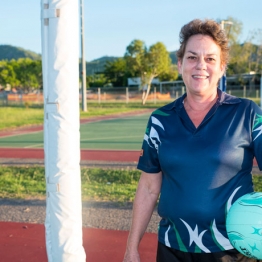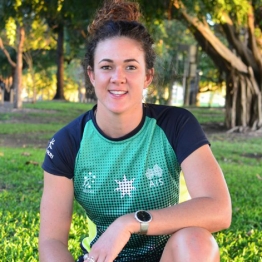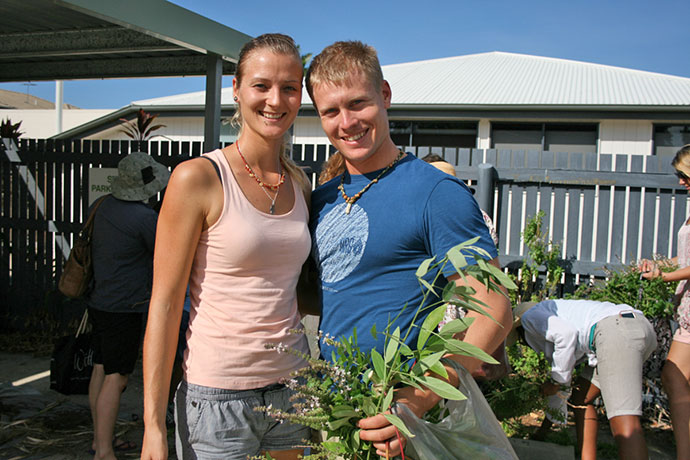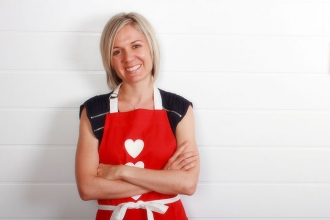TheGo Growers’ Group met for its first session at the weekend and Goers left with arms full of greenery, plenty of tips, and the inspiration needed to start or improve their edible gardens.
This meeting was at Vivienne Salu’s office (Viv runs Active Nutrition and is also an avid gardener and has kindly agreed to lead us on this growing journey – see our first story here). When we arrived, Permaculture Townsville was just finishing off what is known as a Permablitz where an army of volunteers embrace the principle that many hands make light work, digging, planting, composting and constructing to make the space a better place.
Us ‘budding green thumbs’ gathered and Viv gave us some key points, before taking the group out into her yard for a guided tour of the garden she has built from scratch using mostly trial and error. The range of things she has been able to grow is extensive – from pawpaw, passionfruit and pigeon pea, to cassava, sweet potato and lemongrass.
Lots of questions were asked, then Goers were sent home with cuttings to start their own growing projects, some getting cracking that very afternoon.
We caught up with some members of the group to find out what they wanted to learn on their growing journey.
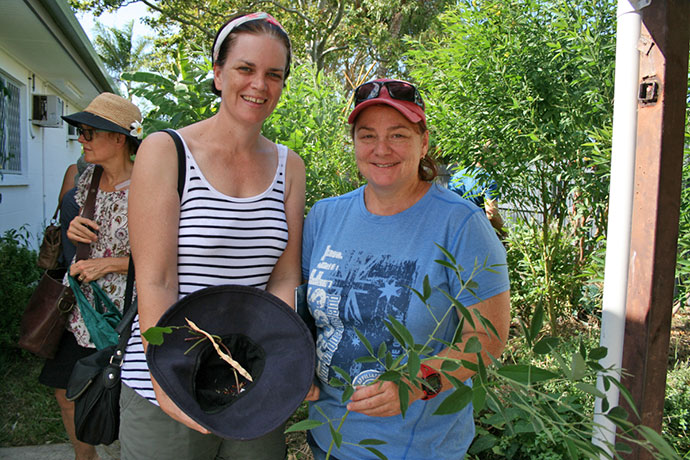
Nic Churchyard and Kelly Bolger
“We want to learn to grow our own food and get the kids involved so that they learn about where their food comes from,” Nic says. “We have a seven-year-old and twin five-year-olds who eat a lot of fruit so we’d like to be self-sufficient.”
Kelly adds: “We’ve just moved into a new place and have a blank canvas, so it would be good to know what we can grow – we love the idea of growing our own food and not throwing as much out because it will all become compost.”
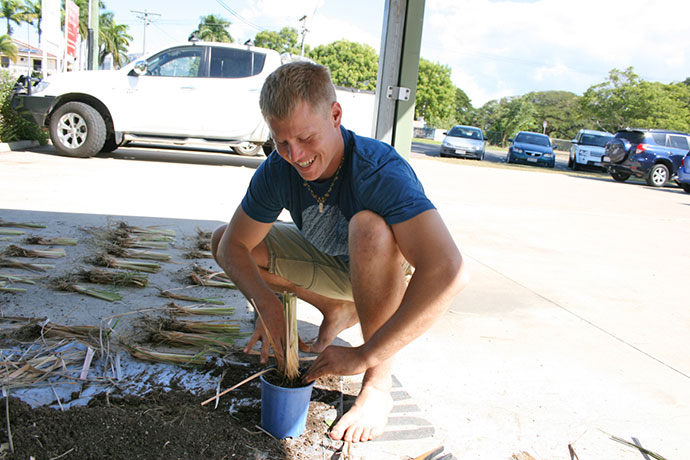
Aline Herzog and Eric Morris
“We live in a rental property and don’t have much room, so wanted to learn how to grow veggies in a limited space, but also have them as self-sufficient as possible so that they don’t die if we go away for the weekend,” Aline says.
Eric adds: “We were inspired by SpurTopia – a family who transformed their rental property into a sustainable utopia, enlisting the help and swapping with the people around them.”

Kate Lea-Rowell
“We recently moved to Pallarenda and have a big area out the back – we have a shed one side and chickens the other. We had two pawpaw trees come down in the last cyclone and everyone in the neighbourhood said they were the best they’ve had, so it must be good soil. We want to grow more pawpaw, plus our own veggies. We’ve never had any knowledge in the past though – we just plant and hope!”
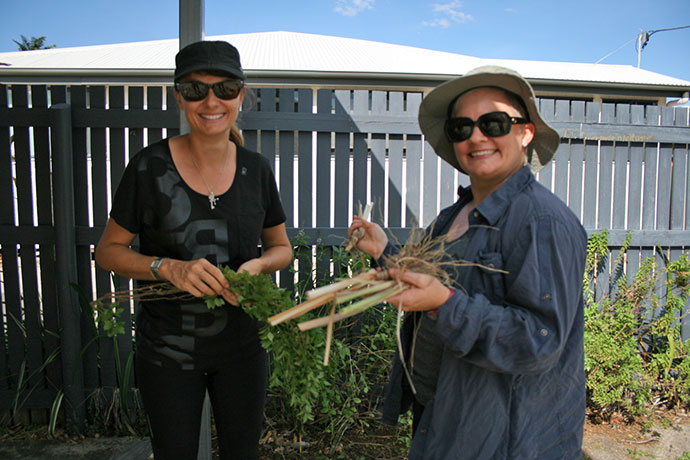
Kate Sargent and Jan Bode
“I’d like to turn my gardening into being a product of doing the right thing, instead of just luck!” Jan says.
Kate adds: “I’ve started an edible garden, but I would love to get some guidance and swap cuttings.”
Take home messages from Viv:
- If you have a location where weeds grow, you’ll be able to grow something there to eat – that’s reassuring!
- Start with your seedling on the windowsill in a jar or similar, then progress it to a pot in the same location, then put the pot in half sun outside, and eventually plant it in the garden. Being on the windowsill in the early days will remind you to water it.
- Start with mastering the herbs in the kitchen, then progress to veggie beds, and finally to your orchard – think of it as zones that you graduate through as skills improve.
- Get good at growing a few things then swap with others; e.g. trade your mint and basil for sweet potato and passionfruit. Or grow what you can and make better buying decisions at the shops, like buying locally grown or organic produce, until you develop your skills or find people to swap with.
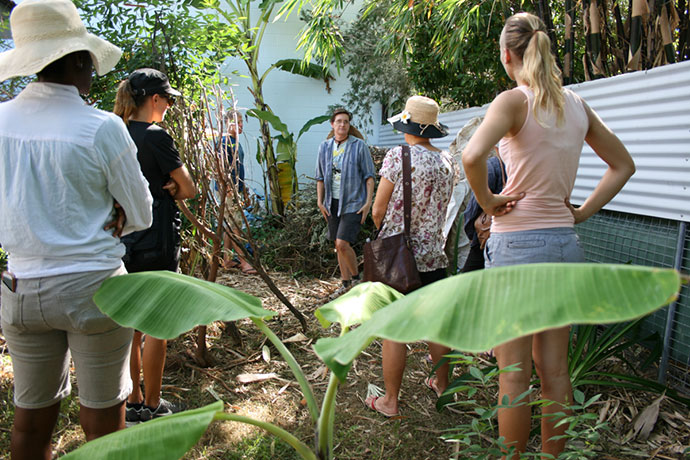
Viv telling TheGo Growers’ Group about bananas.
Some ideas of what to plant in May:
- Green beans
- Peas
- Basil
- Beetroot
- Carrot
- Chives
- Coriander
- Choko
- Garlic
- Ginger
- Lettuce
- Pak Choy
- Pumpkin
- Sweet potato and potato
- Radish
- Rockmelon
- Spring onion
- Strawberries
- Watermelon
- Zucchini
- More options for May here.

Old toilet roll holders and moist paper towel can offer a great way to keep moisture in until your seeds are ready to sprout.
More food for thought…
- Use the wasted water in your fence borders where possible – if your neighbour irrigates garden beds near your fence line, plant something (non invasive) next to the fence and you won’t need to water it.
- A pioneer plant is something that’s planted for shade and to boost soil nutrients, and other plants grow under it. In Viv’s garden, pigeon pea plays a big part in this role, but you need to be careful that whatever you choose isn’t allowed to go to seed, as this will exhaust the nitrogen levels.
- Sweet potatoes are really easy to grow and well suited to our tropical climate. You can even eat their leaves. Find more info about growing sweet potatoes see here.
- Banana plants need a lot of water and fertiliser – chicken or horse poo are great. It will take about 12 months to get fruit.

This cassava was unearthed during the Permablitz and is about two years old.
Get involved
The next TheGo Growers’ Group meeting will be at Eco Fiesta on Sunday, May 31. If you are interested in getting involved email [email protected]. Please note: The group is currently full, but with Eco Fiesta being a larger event, there is some scope to come along and get some tips.

